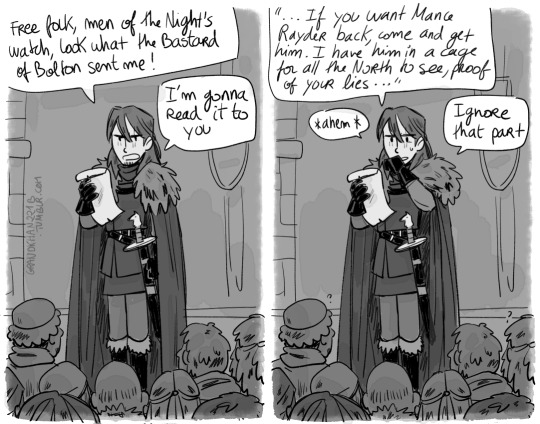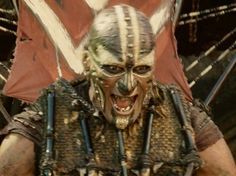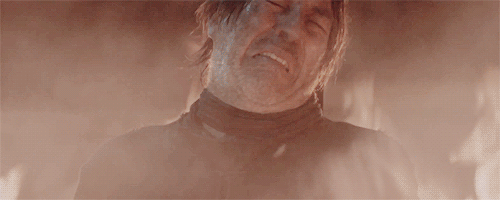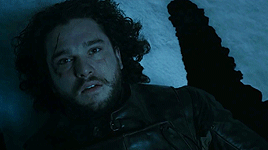#and after tormund is saying that's strange what did he mean about mance?
Explore tagged Tumblr posts
Text

Jon, my guy, I know you were having a moment but you didn't need to read that part out loud
#and after tormund is saying that's strange what did he mean about mance?#and jon is like haha yeaah idk its so weird lol am I right ?? anywayy#lucky for him he died before anybody could think too hard about this#asoiaf#a song of ice and fire#fanart#my art#jon snow#mance rayder#valyrianscrolls
764 notes
·
View notes
Note
So...racism in ASOIF. Pretty blatant, no? His clear equation of whiteness with beauty? The manner in which lands of color are always sexually...open. GRRM tries, sometimes, he really does, but there's some unhealthy shit there right? Could you give your thoughts on that, or link to a time when you have? Thank you! (Yes, I know my name is misspelled.)
Blanket statement before I start on this one: you can love a story to pieces and still point out its flaws and blind spots, including the racist kind. If we only consumed non-problematic media, we would consume no media whatsoever, but we still gotta be honest with ourselves about where our faves fall short. ASOIAF is my very favorite thing (shocking, I know), yet aspects of it are disappointing, and this is one of them.
For me, what really crystallized the problem with how GRRM writes the Dothraki and the Ghiscari especially is when I read some insightful people comparing that writing to how the author frames the wildlings. Personally, I think GRRM does some of his very best writing with the Free Folk. Throughout the series, the author lavishes attention on their individuality, their rich and sad history, their multi-faceted ideology and how it plays out in each of their unique life stories, all geared toward making Jon—and us—feel for them. Not just intellectually understand that they are human beings like anyone else, but feel it, in his and our bones.
I want to really emphasize individuality, because it’s important—putting faces on the monolithic swarm changes Jon’s entire worldview over the course of ACOK, ASOS, and ADWD. That’s not just a band of stinking wildlings howling for blood, not anymore. That’s Ygritte, kissed by fire, who loved and was loved, lost and was lost. That’s Tormund Giantsbane, the only one of Jon’s many dads who doesn’t project anything onto him, but simply enjoys his company and wants him to be happy. That’s Mance and Gilly and Val, people that I care about and feel I have come to know. “This is a whole people come together.” One of the worst among them gets a POV; Varamyr Sixskins is the most stomach-churning face we ever wear, but by his prologue’s end, he’s a thoroughly fleshed-out villain, his life story told. I understand him, and my understanding of the wildlings as a whole is richer for what his story communicates.
This is good storytelling, in other words. Really good. Not flawless, but overall, it’s an engine of empathy and humanization with a big-picture political aim: the wildlings are people too, and that means we have to stand with them against the Long Night.
“When the cold winds rise, we shall live or die together. It is time we made alliance against our common foe.” He looked at Jon. “Would you agree?”
“My father dreamed of resettling the Gift,” Jon admitted. “He and my uncle Benjen used to talk of it.” He never thought of settling it with wildlings, though… but he never rode with wildlings, either. He did not fool himself; the free folk would make for unruly subjects and dangerous neighbors. Yet when he weighed Ygritte’s red hair against the cold blue eyes of the wights, the choice was easy. “I agree.”
It’s stirring stuff, and a model to be studied. Those who were initially barbarians in our POV’s eyes are humanized…
…when they are white. When they are not white, the humanization drops off to a glaring and significant degree. Jon and Dany are paralleled throughout the story, but this is one very telling difference: the cultural Other in Jon’s story gets a human face, while Dany’s (to an overwhelming if not 100% complete degree) stays a swarm. This is true whether said swarm is being presented negatively…
Four of the men seemed to be named Grazdan, presumably after Grazdan the Great who had founded Old Ghis in the dawn of days. They all looked alike; thick fleshy men with amber skin, broad noses, dark eyes.
…or positively.
She trotted, then cantered, then broke into a gallop, her braid streaming behind. The freed slaves parted before her. “Mother,” they called from a hundred throats, a thousand, ten thousand. “Mother,” they sang, their fingers brushing her legs as she flew by. “Mother, Mother, Mother!”
You can definitely see parallels between Dany’s assimilation into the Dothraki in AGOT and Jon’s rumspringa with the wildlings in ASOS; @racefortheironthrone makes that case here. But the difference is that in Dany’s story on the Dothraki Sea and in Slaver’s Bay, there’s so rarely even the pretense of individualization. I challenge anyone to describe to me the characterization of Dany’s bloodriders—give me a paragraph on what makes Aggo and Rakharo different. (You would be able to with Mance v. Tormund.) Tell me about Hizdahr zo Loraq and Reznak mo Reznak as human beings. (You would be able to with Ygritte and Varamyr.) Where is the Tormund of the Dothraki? Where is the Ygritte of the Ghiscari? They are not there…or rather, they are, but GRRM doesn’t bother showing them, and seems more than a little disinterested in the people he does show. He finds “the human heart in conflict with itself” in so many other parts of the story, yet not here.
This is where Jon ends up RE the wildlings:
“I am the shield that guards the realms of men. Those are the words. So tell me, my lord—what are these wildlings, if not men?”
This is where Dany ends up RE the Ghiscari:
It was a city of strange men with strange gods and stranger hair, of slavers wrapped in fringed tokars, where grace was earned through whoring, butchery was art, and dog was a delicacy.
The latter is never countered within the text itself. We are not shown how Dany is wrong. This is a problem. (I say that even while worshipping at the altar of Dany X ADWD and recognizing that moment’s place within her personal arc; vast, contain multitudes, and so on.) But this failure of empathy, imagination, dramatization, and humanization did not occur in isolation. This is a major problem with the genre as a whole, and it’s honestly one of the reasons I’m generally much more of a horror and sci-fi guy than a fantasy guy. Those have their own issues, of course (because, again, everything we create does), but fantasy’s history lends itself to a particularly colonialist-nostalgia-tinged take on things. That is far too big a subject to summarize here, and of course concerns our relationship to all media, not just fantasy stories. So, given that a picture is worth a thousand words…Peter Jackson knew to cut Tom Bombadil, but he didn’t know to cut this:

So when I say that the way GRRM has written this fantasy story speaks to a racial blind spot, I am not making a problem up out of thin air because I want to be mad about something, as is the all-caps accusation every single time anyone brings this up. I am saying that this is yet one more nail, and that while GRRM has addressed many of the genre’s tropes and cliches with style to spare, he has also proved willing to take some disappointing and well-trodden shortcuts.
942 notes
·
View notes
Note
Jon needing to be saved tim and time again Stannis, Crasters wife, Sansa and LF, Sandy, Benjen is too just overdone. Basically like a damsel in distress because it were a woman, people would have been saying exactly this. They always put him in these situations, same as Jon will die or won't die?
I don’t mind the moments when Jon needs other people to help him. I think that he does so much good for others that when people help him it’s just fine. And I couldn’t think of anyone less a damsel than my boy Jon Snow.
So here we go, you didn’t ask for this but you’re going to get it. All of the times Jon Snow either shows he is a strong ass dude who can take care of himself and/or the times Jon does genuine good for others that earn him a little good karma and assistance.
This will strictly refer to the show!Jon since anon is bringing up some examples of Jon being “saved” that we don’t know will take place in book!universe (Sansa/LF, Benjen, etc).
Jon grows up in a household full of people he can nevertruly feel a sense of belonging with. He loves his father and siblings so muchbut Catelyn and (we are to assume based on her insistent apology in 6.04) Sansa make sure he is aware that he is one apart from them. So one would understand if maybe Jon turned out to be weak or bitter. But he’s not.

He is driven from his home as a teenager,sent to live in one of the most inhospitable—and we later learn, dangerous—placesin the world. Yes, he’s a bit of a shithead at first when he’s there but he quicklylearns his place and makes friends with his brothers. The real reason I bringup his early time at the The Wall is because we get to see the strength of Jon’scharacter very quickly when he defies Alistair Thorne, putting his own statusthere in jeopardy, just to defend his friend, Sam. That takes its own sort ofbravery.

At the end of the first season after Ned is killed Jonalmost deserts The Wall so he can fight at Robb’s side. He knows theconsequences of being a deserter. Our first scene with Jon shows him watching abeheading of a deserter. He knows that he will be on the run forever and willhave to hide his identity, but he is perfectly willing to ruin his own life totry to help his brother.
In season 2 when he ranges north of The Wall with hisbrothers he is separated from them with Qhorin Halfhand and falls upon thegroup of wildlings. Jon is expected to execute Ygritte but he doesn’t, becausehe thinks for himself and sticks to his own ideals. He knows early on that itisn’t right to kill someone just because they were unlucky enough to be born northof The Wall. He defies his superiors again, again to help someone else.

When he is taken prisoner by the wildlings he followsthrough with Qhorin’s plan to stage a fight, and as Qhorin orders, Jon killshim. This is a man Jon admires, his ally. This was likely incredibly difficult buthe does it to keep them both from dying as wildling prisoners so that someonecan get back to the Watch and deliver news of what they’ve discovered.
Then Jon manages to ingratiate himself to the wildlings andbecome one of them. And while to some extent it’s an act so he can get back toCastle Black alive, he also genuinely likes the wildlings and develops realrelationships with them and a real appreciation for their spirit and way oflife. Even so, he never forgets his duty and almost dies getting back to TheWall to report back to his Brothers.
He doesn’t lie about breaking his vows and sleeping withYgritte. He could. There aren’t any wildlings at Castle Black to contradict isstory. But he is open and honest with Thorne, Maester Aemon, and the othersbecause Jon is an honest person and someone who always takes responsibility.
He takes some men with him back north of The Wall after hisreturn to avenge the mutiny at Craster’s Keep. He is under no obligation toundertake such a task and the party of men to go with him is small. Doing thisagain signifies Jon’s principles and sense of justice. He does not leave theresponsibility to someone else but takes it on himself at great personal risk,and he is successful.
When the wildlings assault Castle Black Jon fights peoplewho were his friends, and he fights bravely. If it wasn’t for his warnings tohis Brothers, his battle strategy, and his own fighting prowess, one couldargue that Castle Black would have fallen to the wildlings’ greater numbersthat day.
He then travels north of The Wall again to face Mance man-to-man and try to treat with him, knowing that to do so is likely suicide. I can’tstress this enough. In what way is this kind of courage indicative of a “damsel”character?
When Stannis’s men apprehend the wildling forces and attempt to burnMance at the stake, Jon Last of the Mohicans their sadistic asses and shootsMance to end his suffering. Once again, what a badass. He has just witnessedfirsthand what Stannis and Melisandre are capable of, and still put himself onthe line to save his friend from a tortuous death. I mean???

Also in season 5, Jon is elected Lord Commander. He hasrisen through the ranks from being a simple bastard, barely more than a child,to the leader of a force of men that protects the entire realm from thegreatest threat it has ever known. He of course, like literally ANY human, hadhelp along the way from others, but no one gavethis to him. He earned it, and did the job well—though not well enough toplease all of his Brothers (but more on that later).
While serving as Lord Commander Jon brought about the mostradical reform in the history of the Night’s Watch. He travelled north of TheWall to Hardhome with Tormund to treat with the last of the wildling forces.This scene shows us the depth of Jon’s courage when he killed a White Walker insingle combat and evacuated thousands of wildlings to safety so that the NightKing didn’t have a total victory that day.

He actually brought wildlings through the gates and intosafety despite intense protest from his Brothers. Once again, Jon put himselfin harm’s way to help other people. And of course, as we know, this cost himhis life. Literally. Thorne and the others murder Jon for what they considertreason to The Watch.

When he is brought back, Jon is given literally no time tograpple with what has happened to him. He has died and seen that there is noafterlife. He is visibly extraordinarily shaken by this incident and wantsnothing more than to leave The Wall and find peace somewhere else. But thenSansa arrives and we get another example of Jon putting his personal wellbeingsecond to assisting others.

He even tells Sansa that he has spent his entire lifefighting and is tired. But he agrees to help her take Winterfell back from theBoltons and in doing so takes part in an extremely dangerous battle where theodds are stacked soundly against them. This, as we know, starts off with Ramsay’ssick game in which he murders Rickon right before Jon’s eyes. This causes Jonto abandon the battle plan and the pincer maneuver as he rushes headlong into acolumn of armed cavalry.

Is it ill advised? Yes. Is it an emotional decision on hispart? Yes. But is it cowardly, inept, or something that makes him a “damsel”who needs saving? No. I believe strongly after having watched 6.09 severaltimes now that even if Ramsay had not pulled his stunt with Rickon and Jon’smen had followed their original battle plan verbatim, they still would have lost to Ramsay’s superior numbers and clearlyvery well-trained army without the assistance of The Vale.

So I guess you could make the argument here that the men ofThe Vale had to “rescue” Jon like a damsel in distress character. But Idisagree. This is one of the big issues that I have with season 6 and with therelationship the writers created between Jon and Sansa. Sansa knew that she hadLF on her side and the Vale’s army at her disposal, but she chose to hide thisfrom Jon. So I feel this is a matterof viewer perspective. You say Jon needed to be rescued because he is a damsel.I say Jon would not have needed any help and thousands of men could have livedinstead of died on that battlefield if only Sansa had been honest with him. Iknow that Sansa has been hardwired not to trust anyone after all that hashappened to her throughout the series, but we even heard that she trusts Jonwhen Brienne asks her about it. In the now famous scene where Briennehilariously calls Jon “brooding.”
And she had plenty of opportunity to put that trust inJon and tell him about LF. The writing in this part of the season was verystrange to me. We saw scenes, such as the one where Jon receives the letterfrom Ramsay, where Sansa was treated with respect and allowed to speak freelyand say her piece among his men and advisors. When they went around the Northasking the Stark bannermen for assistance, Sansa was by Jon’s side, treated asan equal, freely allowed to speak with these lords and try to win their favor.At no point do we see Sansa silenced by Jon or Davos or Tormund, etc. Yet onthe eve of battle, their dialogue suggests that Sansa has been given no chanceto warn Jon of Ramsay’s trickery or to tell Jon that she’s got an ace up hersleeve, that if they wait just one day, the numbers will be on their side andtheir chances of victory will be far better with LF’s army.

Instead they have a yelling match in the tent during whichSansa cryptically tells Jon not to do what Ramsay expects him to do, and leavesit at that. If she had told him that she has this other force coming their way,then things could have been different and no one would have needed saving inthe first place. I don’t feel that the events of 6.09 are the result of Jon’sown failings or something that required him to be saved as if he is a helpless,damsel character. What I think actually happened in that instance was thewriter’s doing a huge disservice to Sansa’s character–one of the smartest women and most adept survivors in the show–by making her withhold importantinformation with no real good reason that we can see, resulting in anear-disaster that simply made better suspense and good TV for the viewer because it caused the battle to be more dire for our heroes.
And as far as Benjen is concerned, the wight hunt in general seems, from what we know, to be a very foolhardy endeavor but a necessary one nonetheless. It is just another instance of Jon walking into danger to do what MUST be done. It is conceivable for not only Dany but the rest of the southron lords to need proof in order to be invested in the Great War, and someone needs to get that proof. We have seen at Hardhome just how devastatingly powerful the WW army is, and Jon faces their horde with only a handful of men. That is incredibly brave and yes, I am glad that Benjen intervenes to help him in this crucial moment.
But overall, for every person who has ever come to Jon’said, he has helped more people. He is a physically and mentally strongcharacter who still maintains his conscience and kindness in a cruel and twistedworld. Jon Snow is by far my favorite character and I will continue to love himforever, and hope that people save and help him, as he saves and helps others.Because he is the glue holding all of our favorite characters together, andwithout him, we would be watching a very different, and frankly not asinteresting show.

I think what would be boring and unwatchable would be if Jonnever needed help. If he was this impossibly perfect hero figure who not onlyalways saves the day, but is always moral and good, always does the rightthing, always looks fuckable, is a sex god who goes down on women unprompted,always treats his family right … doyou see what I’m saying? He has to mess up sometimes to be human We all needhelp sometimes, even Jon Snow. And I don’t think that makes him like a weak character as you suggest. I don’t think that at all. If anything I thinkit is more progressive in terms of gender tropes for Jon to need savingsometimes. So I don’t really know what prompted this ask, anon.
83 notes
·
View notes